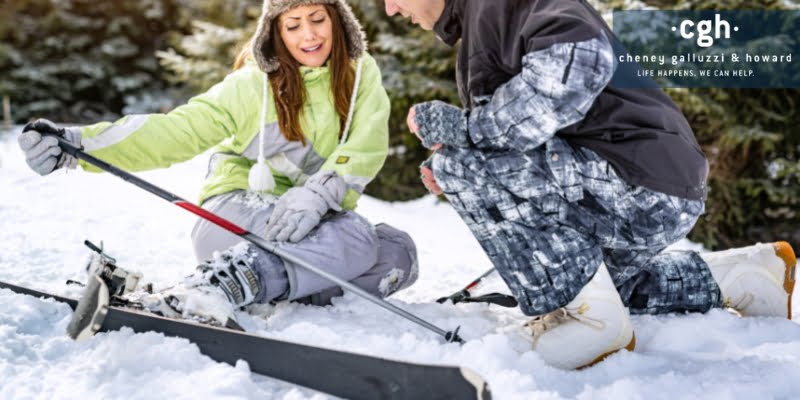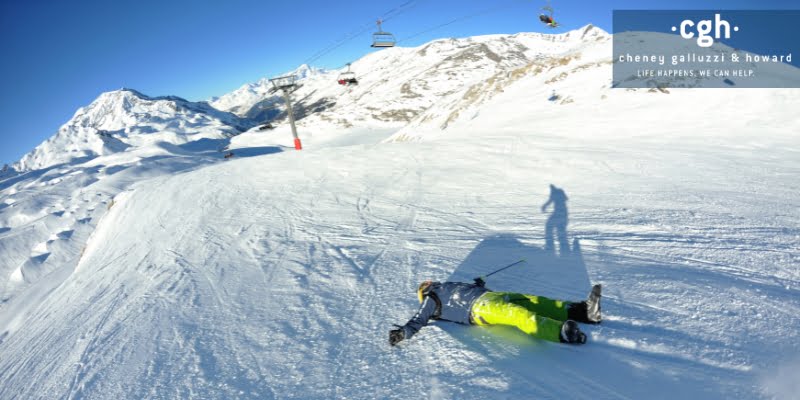Denver Ski Accident Lawyer
Recovering Compensation From Ski Accident Claims in Denver, Colorado
Skiing is one of the great pastimes of Colorado life. With some of the greatest ski terrain in the world and a long season, locals and tourists alike flock to Colorado’s many world-class ski resorts each winter for exercise, fun and relaxation ― skiing, though, can be a dangerous activity, and can lead to accidents and serious injuries. If you have been injured in a ski accident and you believe the ski resort may be at fault, you should contact a ski injury lawyer – like the Ski Accident attorneys at Cheney Galluzzi & Howard – to understand your rights and whether you have a viable claim against the resort.

The Ski Safety Act
Because of the Ski Safety Act of 1979, and subsequent amendments, ski resorts in Colorado are generally protected from liability for injuries or death resulting from the “inherent dangers and risks of skiing.” These “inherent dangers and risks” include, at least: weather conditions, snow conditions, surface and subsurface conditions, natural objects, man-made objects, variation in the steepness of terrain (whether natural or as a result of slope design, snowmaking, or grooming operations), roads, collisions with other skiers, and the failure of the skier to ski within his or her own abilities. The term “inherent dangers and risks of skiing” has been interpreted broadly by Colorado courts: ski accidents resulting from anything from avalanches to injuries caused by rubber mats placed at the end of snow tube runs to slow tubers down has been held to fall within the “inherent dangers and risks of skiing.”
The Ski Safety Act protects ski resort operators not only from liability for injuries resulting from ski accidents suffered by active users of the slopes, but also protects ski resort operators from liability for injuries resulting from ski accidents suffered by anyone who uses the facilities of a ski area. The Ski Safety Act extends to other areas of the ski resort besides the ski slopes themselves. The language of the Act implies that it would cover summer users of toboggan runs and mountain bike facilities as well. One area, however, where the Ski Safety Act does not protect ski resort operators is in the parking lots. Injuries resulting from accidents in the parking lots are covered by the Premises Liability Act.
The Ski Safety Act does, however, impose duties on the ski resort, specific duties to warn patrons of the inherent risks of skiing. The statute requires ski resort operators to post warning signs with specific required language, as well as to post the warning language on all ski lift tickets. If the ski resort failed to place the specified warning notices either on the grounds of the ski resort or the lift tickets, the ski resort will no longer be protected from liability for injuries resulting from ski accidents. The ski resort, however, does not have a duty under the Ski Safety Act to revoke skiing privileges of reckless or careless skiers.
The protections from liability for ski resort operators under the Ski Safety Act have been expanded by the Colorado legislature to cover voluntary members of ski patrol as well as bystanders who, in good faith, render emergency care at the site of a ski accident without compensation. The Ski Safety Act, however, does not protect individual skiers from liability for injuries brought by another skier who is injured in a ski accident or collision resulting from the individual skier’s negligence.
The Ski Safety Act additionally affects the length of time in which a person injured in a ski accident may bring a lawsuit, as well as the amounts and types of damages that people injured in ski accidents are able to recover. The Ski Safety Act imposes a statute of limitations requiring lawsuits to be filed against ski resort operators and employees within two years of the date of the accident. The Act also caps the damages a person injured in a ski accident can recover at $1 million. Derivative claims – that is, claims for wrongful death brought by survivors or for loss-of-consortium brought by family members of someone killed in a ski accident – are capped at $250,000, which is included in the $1 million maximum liability for ski resort operators. The limit on damages in the Ski Safety Act supersedes the damages awardable under the Wrongful Death Act. Courts, however, have the power to adjust the punitive damages awarded in a wrongful-death action if the court deems the $1 million damages cap to be unfair in a particular case.

Contact Our Denver Ski Accident Attorneys For Help Navigating The Legal System
When you are injured in a ski accident, there is a complex web of statutes and case law that you must navigate in order to determine whether you are able to recover damages for your injuries from the ski resort. Our attorneys have experience in ski accident cases, and can use their knowledge and skill to help you determine whether bringing a lawsuit for your ski accident injuries is the best course of action for you. If you’ve been injured in a ski accident, call our law office in Denver at 303-209-9395 or contact us online.
Call An Accident Attorney At Cheney Galluzzi & Howard Today!
We offer a free initial consultation to discuss your case and answer your questions. Call us at
© 2024 Cheney Galluzzi & Howard, LLC | All rights reserved.

